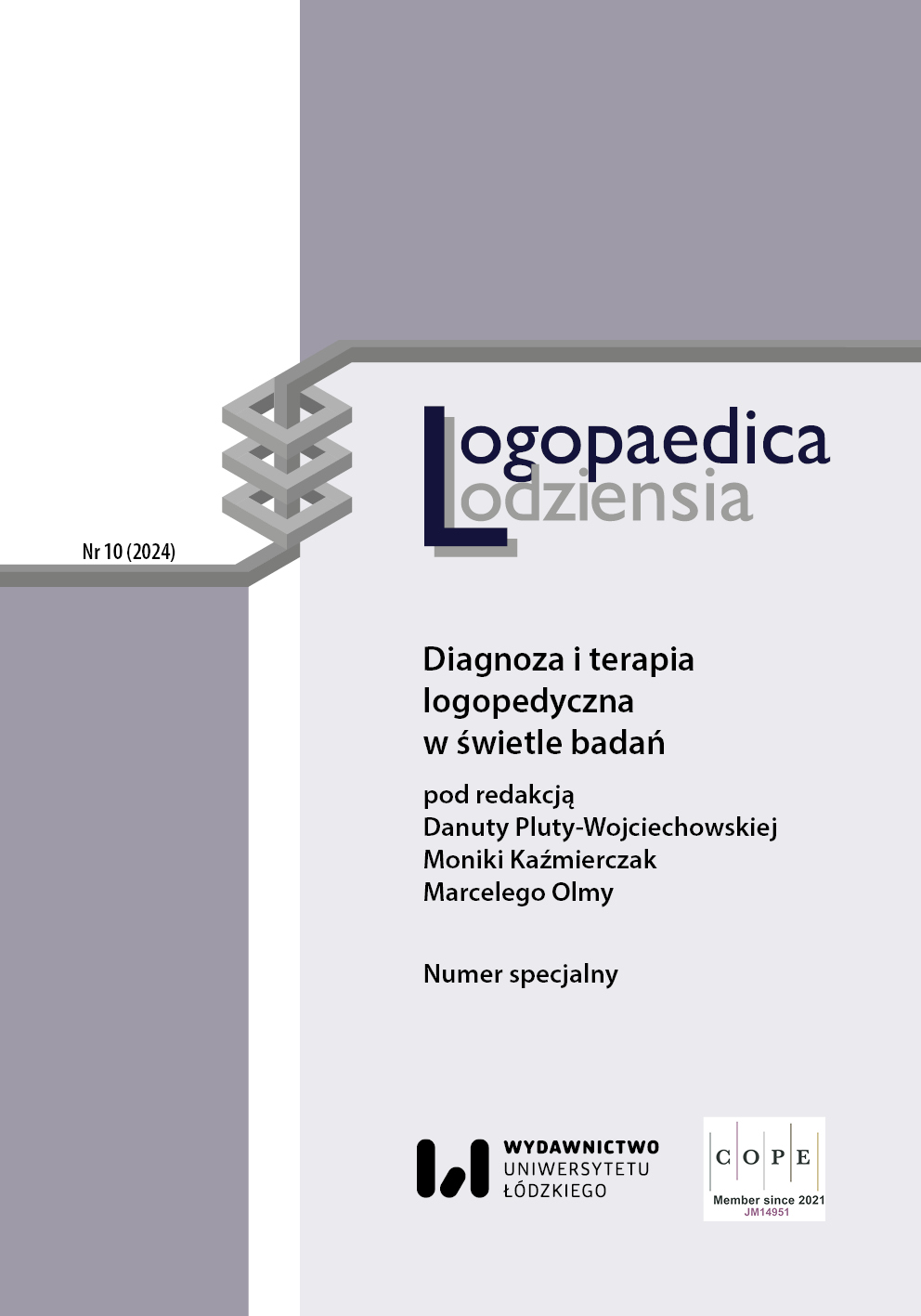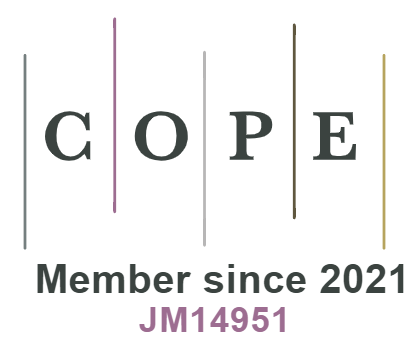Holistyczno‑socjoekologiczny model profilaktyki giełkotu. Założenia – cele – wyzwania
DOI:
https://doi.org/10.18778/2544-7238.10.09Słowa kluczowe:
giełkot/mowa bezładna, profilaktyka, paradygmat holistyczno-socjoekologiczny, logopediaAbstrakt
Nie tylko w Polsce dostrzega się konieczność dopełniania i upowszechniania wiedzy o wciąż mało znanym fenomenie językowo‑komunikacyjnym, jakim jest giełkot. Ma to istotne znaczenie zarówno dla osób z giełkotem, jak i dla środowiska, w którym żyją. W artykule omówiono główne cele i założenia profilaktyki giełkotu. Zaproponowany model holistyczno--socjoekologiczny pokazuje skalę potrzeb i wyzwań, jakie stoją przed logopedami, osobami z doświadczeniem giełkotu oraz ich otoczeniem. W artykule zostało podkreślone to, że cenne inicjatywy w zakresie profilaktyki giełkotu już są podejmowane, jest też potrzeba ich kontynuowania i rozszerzania tego typu działań w przyszłości.
Pobrania
Bibliografia
Adams Ch., Boroń A., Cook S., Pakura M., Węsierska K., 2023, Giełkot – co to takiego?, poster zaprezentowany podczas 3rd World Conference on Cluttering, 16–17.09.2023 r. w Katowicach, https://sites.google.com/view/icacluttering/resourcesdownloads/cluttering‑posters (dostęp: 29.12.2023).
Google Scholar
DOI: https://doi.org/10.12968/nuwa.2023.12.16
Błachnio K., 1995, System nowoczesnej profilaktyki logopedycznej, „Logopedia”, nr 22, s. 21–31.
Google Scholar
Błachnio K., 2001, Vademecum logopedyczne dla studentów pedagogiki, Poznań: Wydawnictwo Naukowe Uniwersytetu Adama Mickiewicza.
Google Scholar
Boroń A., 2023, Wiedza ma znaczenie! Świadomość giełkotu wśród rodziców, poster zaprezentowany podczas 3rd World Conference on Cluttering, 16–17.09.2023 r. w Katowicach, http://ica.fcl.org.pl/photo.html (dostęp: 29.12.2023).
Google Scholar
Bronfenbrenner U., 1979, The Ecology of Human Development: Experiments by Nature and Design, Cambridge: Harvard University Press.
Google Scholar
DOI: https://doi.org/10.4159/9780674028845
Bronfenbrenner U., 1995, Developmental ecology through space and time: A future perspective, [w:] P. Moen, G.H. Elder Jr., K. Lüscher (red.), Examining lives in context: Perspectives on the ecology of human development, Washington: American Psychological Association, s. 619–647.
Google Scholar
DOI: https://doi.org/10.1037/10176-018
Cluttering Conversation, b.r., https://soundcloud.com/paula‑kathy (dostęp: 15.05.2023).
Google Scholar
Cluttering Speech, b.r., https://www.facebook.com/groups/56339307698/ (dostęp: 15.05.2023).
Google Scholar
DiLollo A., Favreau Ch., 2010, Person‑Centered Care and Speech and Language Therapy, „Seminars in Speech and Language”, Vol. 31(2), s. 90–97.
Google Scholar
DOI: https://doi.org/10.1055/s-0030-1252110
Espinoza A.K., 2023, Myths about cluttering, poster zaprezentowany podczas 3rd World Conference on Cluttering, 16–17.09.2023 r. w Katowicach, http://ica.fcl.org.pl/photo.html (dostęp: 29.12.2023).
Google Scholar
Georgieva D., 2001, Professional awareness of cluttering: A comparative study (Part two), [w:] H.G. Bosshardt, J.S. Yaruss, H.F.M. Peters (red.), Fluency disorders: Theory, research, treatment and self‑help. Proceedings of the Third World Congress on Fluency Disorders in Nyborg, Denmark, International Fluency Association, Nijmegen: Nijmegen University Press, s. 630–635.
Google Scholar
Georgieva D., 2010, Understanding cluttering: Eastern European traditions vs. Western European and North American traditions, [w:] K. Bakker, L. Raphael (red.), Proceedings of the First International Conference on Cluttering, Katarino: International Cluttering Association, s. 230–243.
Google Scholar
Golańska J., Jurkowska N., Krzemińska N., Kaźmierczak M., 2023, Predicting cluttering in young adults: preliminary results of students’ self‑assessment/Prognozowanie giełkotu wśród młodych dorosłych – wstępne wyniki badań samooceny studentów, poster zaprezentowany podczas 3rd World Conference on Cluttering, 16–17.09.2023 r. w Katowicach, https://www.researchgate.net/publication/375084179_Poster_Predicting_cluttering_in_young_adults (dostęp: 29.12.2023).
Google Scholar
Grabias S., 2019, Język w zachowaniach społecznych. Podstawy socjolingwistyki i logopedii. Wydanie czwarte uzupełnione, Lublin: Wydawnictwo Uniwersytetu Marii Curie‑Skłodowskiej.
Google Scholar
Greenwell T., Walsh B., 2021, Evidence‑Based Practice in Speech‑Language Pathology: Where Are We Now?, „American Journal of Speech‑Language Pathology”, Vol. 30(1), s. 186–198.
Google Scholar
DOI: https://doi.org/10.1044/2020_AJSLP-20-00194
GRUPA G (jak GIEŁKOT), b.r., https://www.facebook.com/groups/172674225070364/ (dostęp: 15.05.2023).
Google Scholar
Gunia G., 2013, Wspomaganie rozwoju zdolności komunikacyjnych dzieci niesłyszących w świetle rozwoju współczesnych paradygmatów surdologopedii, [w:] E.M. Skorek, K.B. Kochan (red.), Wybrane zagadnienia z teorii i praktyki logopedycznej, Zielona Góra: Oficyna Wydawnicza Uniwersytetu Zielonogórskiego, s. 23–32.
Google Scholar
Gunia G., Lechta V., 2011, Wprowadzenie do logopedii, Kraków: Oficyna Wydawnicza „Impuls”.
Google Scholar
Hancock T., Perkins F., 1985, The Mandala of Health: A Model of the Human Ecosystem, „Family & Community Health”, Vol. 8, s. 8–10.
Google Scholar
DOI: https://doi.org/10.1097/00003727-198511000-00002
ICA – International Cluttering Association, b.r., https://sites.google.com/view/icacluttering (dostęp: 15.05.2023).
Google Scholar
Icht M., Zukerman G., Zigdon A., Korn L., 2023, There is more to cluttering than meets the eye: The prevalence of cluttering and association with psychological well‑being indices in an undergraduate sample, „International Journal of Language & Communication Disorders”, Vol. 58(6), s. 2022–2032.
Google Scholar
DOI: https://doi.org/10.1111/1460-6984.12917
Jarczyk M., Kuros‑Kowalska K., 2023, Postawy i poziom wiedzy rodziców dzieci z klas 1–3 szkoły podstawowej na temat giełkotu, poster zaprezentowany podczas 3rd World Conference on Cluttering, 16–17.09.2023 r. w Katowicach, http://ica.fcl.org.pl/photo.html (dostęp: 29.12.2023).
Google Scholar
Kaczmarek L. (red.), 1981, Program studiów logopedycznych, Lublin: Wydawnictwo Uniwersytetu Marii Curie‑Skłodowskiej.
Google Scholar
Kaźmierczak M., 2022a, Perspektywa klienta w giełkocie, „Logopaedica Lodziensia”, nr 6, s. 117–134.
Google Scholar
DOI: https://doi.org/10.18778/2544-7238.06.08
Kaźmierczak M., 2022b, Co pacjent/klient może wiedzieć o giełkocie? Kilka refleksji po lekturze książki Too fast for words. How discovering that I don’t stutter but “clutter” changed my life2 Rutgera Wilhelma (Nijmegen: Big Time Publishers 2020, 175 s., ISBN: 979–86–664–4439–9), „Forum Lingwistyczne”, nr 10, s. 1–6.
Google Scholar
DOI: https://doi.org/10.31261/FL.2022.10.03
Kaźmierczak M., 2023a, The impact of the Facebook GROUP G on the popularisation of knowledge on cluttering in Poland/Znaczenie facebookowej GRUPY G dla popularyzacji wiedzy o giełkocie w Polsce, poster zaprezentowany podczas 3rd World Conference on Cluttering, 16–17.09.2023 r. w Katowicach, https://www.researchgate.net/publication/375085431_Poster_The_impact_of_the_fb_GROUP_G_on_the_popularisation_of_knowledge_on_cluttering_in_Poland (dostęp: 29.12.2023).
Google Scholar
Kaźmierczak M., 2023b, A proposal for a non‑antagonistic approach to disorder and order in cluttering, „Logopaedica Lodziensia”, nr 7, s. 67–78.
Google Scholar
Kaźmierczak M., 2024a, Uwarunkowania diagnozy giełkotu w wieku rozwojowym, „Strefa Logopedy”, nr 58, s. 10–12.
Google Scholar
Kaźmierczak M., 2024b, Giełkot – historia i współczesność, „Prace Językoznawcze”, nr 26(1), s. 219–233.
Google Scholar
DOI: https://doi.org/10.31648/pj.9901
Kaźmierczak M., Golańska J., Jurkowska N., Krzemińska M., 2024, Samoocena polskojęzycznych studentów w kierunku giełkotu – wstępne wyniki badań, „Forum Lingwistyczne” [w druku].
Google Scholar
Krzeszewska P., 2020, Praktyka oparta na dowodach w postępowaniu logopedycznym, „Logopedia”, nr 49(2), s. 233–248.
Google Scholar
LOGOLab, b.r., https://www.logolab.edu.pl/ (dostęp: 15.05.2023).
Google Scholar
McCurtin A., Murphy C., Roddam H., 2019, Moving Beyond Traditional Understandings of Evidence‑Based Practice: A Total Evidence and Knowledge Approach (TEKA) to Treatment Evaluation and Clinical Decision Making in Speech‑Language Pathology, „Seminars in Speech and Language”, Vol. 40(5), s. 370–393.
Google Scholar
DOI: https://doi.org/10.1055/s-0039-1694996
Michalik M., 2014, „Zarządzanie jakością” w logopedii – propozycja metodologiczna, [w:] M. Michalik (red.), Nowa Logopedia, t. 5: Diagnoza i terapia logopedyczna osób dorosłych i starszych, Kraków: Collegium Columbinum, s. 77–94.
Google Scholar
Myers F.L., 2018, Istota mowy bezładnej a interwencja logopedyczna w giełkocie, [w:] K. Węsierska, K. Gaweł (red.), Zaburzenia płynności mowy, Gdańsk: Wydawnictwo Harmonia Universalis, s. 44–63.
Google Scholar
Scaler Scott K., 2023, Debunking Myths About the Speech Fluency Disorder, Cluttering, https://leader.pubs.asha.org/do/10.1044/leader.FTR2.28112023.slp‑cluttering‑id.50/full/ (dostęp: 29.12.2023).
Google Scholar
Skorek E.M., 2016, Człowiek z zaburzoną zdolnością komunikacyjną – między zdrowiem a niepełnosprawnością, cz. 1, [w:] J.J. Błeszyński, K.B. Kochan, E.M. Skorek (red.), Edukacyjne oblicza komunikacji: dyskursy interdyscyplinarne, Zielona Góra: Uniwersytet Zielonogórski, Wydział Pedagogiki, Psychologii i Socjologii, s. 33–46.
Google Scholar
Skorek E.M., 2017a, Profilaktyka logopedyczna – ustalenia terminologiczne i konceptualne, [w:] E.M. Skorek (red.), Wielowymiarowość przestrzeni profilaktyki logopedycznej, Zielona Góra: Uniwersytet Zielonogórski, Wydział Pedagogiki, Psychologii i Socjologii, s. 7–50.
Google Scholar
Skorek E.M., 2017b, Profilaktyka logopedyczna – poziomy i strategie, [w:] E.M. Skorek (red.), Wielowymiarowość przestrzeni profilaktyki logopedycznej, Zielona Góra: Uniwersytet Zielonogórski, Wydział Pedagogiki, Psychologii i Socjologii, s. 51–92.
Google Scholar
Skorek E.M., 2017c, Profilaktyka logopedyczna w literaturze polskiej, [w:] E.M. Skorek (red.), Wielowymiarowość przestrzeni w profilaktyce logopedycznej, Zielona Góra: Uniwersytet Zielonogórski, Wydział Pedagogiki, Psychologii i Socjologii, s. 121–148.
Google Scholar
Skorek E.M., 2017d, Profilaktyka a logopedia naprawcza versus logopedia prewencyjna, [w:] E.M. Skorek (red.), Wielowymiarowość przestrzeni w profilaktyce logopedycznej, Zielona Góra: Uniwersytet Zielonogórski, Wydział Pedagogiki, Psychologii i Socjologii, s. 385–410.
Google Scholar
Skorek E.M., 2023, Profilaktyka w logopedii. Wybrane zagadnienia, Kraków: Oficyna Wydawnicza „Impuls”.
Google Scholar
St. Louis K.O., Hinzman A.R., 1986, Studies of cluttering: Perceptions of cluttering by speech‑language pathologists and educators, „Journal of Fluency Disorders”, Vol. 11(2), s. 131–149.
Google Scholar
DOI: https://doi.org/10.1016/0094-730X(86)90028-8
St. Louis K.O., Schulte K., 2011, Defining Cluttering: The lowest common denominator, [w:] D. Ward, K. Scaler Scott (red.), Cluttering: Research, Intervention and Education, London: Psychology Press, s. 233–253.
Google Scholar
Stuttering Foundation, b.r., https://www.stutteringhelp.org/ (dostęp: 15.05.2023).
Google Scholar
Tichenor S.E., Constantino Ch., Yaruss J.S., 2022, A Point of View About Fluency, „Journal of Speech, Language and Hearing Research”, Vol. 65(1), s. 1–8.
Google Scholar
DOI: https://doi.org/10.1044/2021_JSLHR-21-00342
Van Zaalen Y., Reichel I.K., 2017, Prevalence of cluttering in two European countries: A pilot study, „Perspectives of the ASHA Special Interest Groups”, Vol. 2, s. 42–49.
Google Scholar
DOI: https://doi.org/10.1044/persp2.SIG17.42
Węsierska K., 2012, Profilaktyka logopedyczna w ujęciu systemowym, [w:] K. Węsierska (red.), Profilaktyka logopedyczna w praktyce edukacyjnej, Katowice: Wydawnictwo Uniwersytetu Śląskiego, s. 25–47.
Google Scholar
Węsierska K., Sønsterud H (red.), 2021, Dialog bez barier – kompleksowa interwencja w jąkaniu. Wydanie polskie rozszerzone, Chorzów: Wydawnictwo Agere Aude.
Google Scholar
Węsierska M., St. Louis K.O., 2018, Postawy polskich i angielskich studentów logopedii wobec giełkotu i osób zmagających się z tym zaburzeniem, [w:] K. Węsierska, K. Gaweł (red.), Zaburzenia płynności mowy, Gdańsk: Wydawnictwo Harmonia Universalis, s. 142–155.
Google Scholar
Węsierska K., Myszka A., Płusajska‑Otto A., St. Louis K.O., 2015, Osoby z giełkotem w społeczeństwie – diagnostyka, świadomość społeczna, postulaty, [w:] K. Węsierska (red.), Zaburzenia płynności mowy. Teoria i praktyka, t. 1, Katowice: KOMLOGO, s. 251–264.
Google Scholar
Węsierska K., St. Louis K.O., Wesierska M., Porwoł I., 2021, Changing Polish university students’ attitudes toward cluttering, „Journal of Fluency Disorders”, Vol. 67, s. 1–16.
Google Scholar
DOI: https://doi.org/10.1016/j.jfludis.2021.105828
Wielki słownik języka polskiego PAN, b.r., https://wsjp.pl/ (dostęp: 29.12.2023).
Google Scholar
Wilhelm R., 2020, Too fast for words: How discovering that I don’t stutter but clutter changed my life, Nijmegen: Big Time Publishers.
Google Scholar
World Health Organizations, 2001, ICF. Międzynarodowa Klasyfikacja Funkcjonowania, Niepełnosprawności i Zdrowia, Geneva, https://ezdrowie.gov.pl/downloadFile/740 (dostęp: 15.05.2023).
Google Scholar
Woźniak T., 2017, Logopedia na świecie u progu XXI wieku, [w:] D. Pluta‑Wojciechowska, B. Sambor (red.), Współczesne tendencje w diagnozie i terapii logopedycznej, Gdańsk: Wydawnictwo Harmonia Universalis, s. 65–79.
Google Scholar
Pobrania
Opublikowane
Jak cytować
Numer
Dział
Licencja

Utwór dostępny jest na licencji Creative Commons Uznanie autorstwa – Użycie niekomercyjne – Bez utworów zależnych 4.0 Międzynarodowe.












